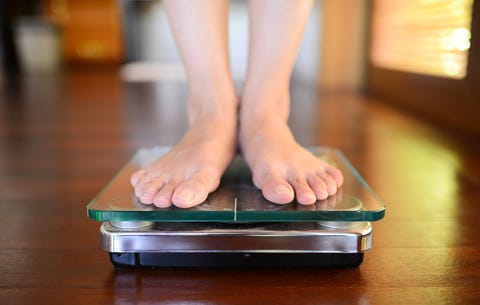With age comes many things: greater wisdom; deeper empathy; a greater sense of knowing who you are; and less happily, the very real possibility of a bigger pants size.
Starting in your 40s, it's easier than ever for the pounds to creep on—and tougher to take them off. Thanks to a slowing metabolism you could be burning 300 fewer calories per day than you did in your early 20s, according to the American Council on Exercise. What's more, falling estrogen levels during perimenopause and menopause (which begin in your early 40s) can cause insulin sensitivity, which makes it harder for your body to control the amount of sugar in your blood, says Caroline Cederquist, MD, a board-certified bariatric surgeon and founder of the meal delivery service BistroMD. This can make your blood sugar levels more prone to spiking and crashing, which can increase your urge to snack—especially on high-carb, sugary junk, Cederquist says.
Put it together, and it's no wonder so many women over 40 end up hitting a weight loss wall. But it doesn't have to be that way. With a few smart moves, you can outsmart your slowing metabolism and get lean—for good.
Sure, some things change after 40. But the basic tenets of successful weight loss stay the same, no matter how old you are. Before you take steps to ageproof your diet plan, it's a good idea to brush up on the basics.

- You need to eat less. It doesn't matter if all you eat is grilled chicken, brown rice, and broccoli. If you don't cut back on your portions, you won't lose weight. Everyone's calorie needs are different, but in general, a woman eating 2,000 calories per day should aim to cut back by 400 to 500 calories, recommends Frances Largeman-Roth, RDN, nutrition expert and author of Eating in Color.
- You should aim to lose 1 to 2 pounds per week. Those drop-a-dress-size-in-a-week plans are tempting. But the slow and steady approach is more sustainable since you're more likely to build healthy habits (like exercising more and eating more veggies) that will help you stay leaner in the long term.
- Skipping meals will mess with your metabolism. When you skip breakfast or dinner, it tells your body to squirrel away calories instead of burning them. Skipping meals also increases the chances that your blood sugar will crash, leaving you ravenous for a quick energy hit in the form of sugary carbs, Cederquist says.
- Keeping your carbs in check—especially the refined kind—can help combat age-related insulin resistance and promote steady blood sugar levels, Cederquist says. Adding more protein to your diet can also help. Not only does the nutrient help stave off age-related muscle loss, but it also helps keep your metabolism revved, because the body has to work harder to digest it than, say, a bagel, Cederquist says. How much of each nutrient you consume each time you eat matters, too. In a perfect world each meal and snack should have:
- Vegetables or fruit: Fill half of your plate with these. They’re high in fiber and water, so they'll take up lots of space in your stomach without contributing too many calories to your diet.
- Lean protein: Your plate should have a serving that’s about the size of your palm. Good sources include Greek yogurt, eggs, chicken, and fish.
- Complex carbohydrates: Your plate should have a serving that’s the size of your closed fist. Whole grains, beans, fresh fruit, and starchy veggies (like sweet potatoes) are all good choices.
- Healthy fats: These can add up quickly when you're trying to lose weight, so it's worth measuring your fats. Aim for 7 to 10 grams every time you eat. That’s 1½ tsp of olive oil, a quarter of an avocado, or two tablespoons of nuts or seeds.
Source:prevention.com/weight-loss/a20465042/lose-weight-over-40/











0 comments:
Post a Comment